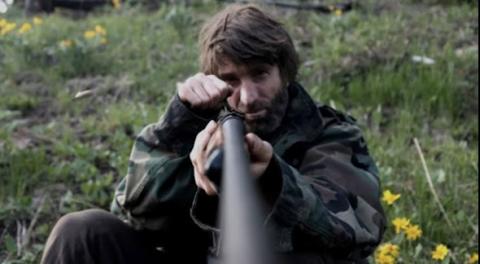‘Ted K’ Searches for the Disturbing Core of the Unabomber

Ted Kaczynski embodies the complexity of the extremist mind; in pursuing a virtuous cause, Kaczynski was driven to fatal violence by the accelerant of certainty. This Harvard-educated mathematical wunderkind’s critique of industrial society has a ring of validity that lends a further layer of unease to the bombings he committed between 1978 and 1995. The nuances of “the Unabomber” have thus far eluded dramatic treatment. Kaczynski has been reduced to a primitivist lunatic in lurid TV movies, nothing more than the subject of a manhunt.
Tony Stone’s film attempts to burrow beneath the mythology and locate something of the man. It is an interesting companion piece to the 2020 Netflix mini-series Unabomber: In His Own Words, which uses Kaczynski’s own prison recordings to try and locate the point at which Kaczynski went from an assistant professor on the tenure track at U.C. Berkeley to America’s most wanted domestic terrorist. Ted K does not follow such a strict biographical path, opting instead for a kind of psycho-biography that endeavours to map Kaczynski’s mental terrain.
This approach has its pitfalls; it precludes deep background, and instead presents the culmination of everything that created the man we see living in his remote Montana cabin – the film was shot on the land where the cabin stood. It would have been interesting to see the ‘psychological study’ Kaczynski took part in at Harvard – reputed to have been part of Project MKULTRA – which permanently scarred him psychologically, but Ted K is more concerned with detailing the steady ratcheting up of Kaczynski’s resolve to exact “personal revenge.”
Ted K strives to replicate the jaundiced eye with which Kaczynski sees a despoiled world, but it maintains a stylistic neutrality that tempers Ted’s more fevered imaginings. Nathan Corbin’s photography operates as a filter, evincing a kind of aversion for its subject. The camera holds to the middle distance, zooms in tentatively, and reserves close-ups for Kaczynski’s interactions with authority figures and representatives of officialdom. This distance has its own jarring effect – what scandalised audiences about Henry: Portrait of a Serial Killer (1986) was not just the violence, but the detachment with which it was shown. Ted K engenders a similar suspicion that the viewer is complicit in Kaczynski’s gaze.

Ted K trades in the abstractions it is necessary for Kaczynski to create. Other characters are merely projections; hovering on the edge of the frame, almost comically distended and grotesque when Kaczynski ventures into the city, speaking to his alienation. There is one strange interlude that feels like it’s been transplanted from a Michael Mann film with its prolonged slow motion and conspicuous needle drop, but the ominous score from Blanck Mass maintains a consistent tone; its dark synths and ambient drones never overwhelm a scene.
The film plays out like a twisted take on Walden, throwing Thoreau into the horror grinder. Tom Obzud’s sound design brings a visceral quality to Kaczynski’s activities – from the preparation of food to the construction of explosive devices, every action is imbued with a pungency that almost rises from the screen. Kaczynski is another of God’s lonely men, looking for solutions to his isolation in disturbing action, but there is no attempt to either valorize or condemn his choices. Ted K is more concerned with effects, the imprint Kaczynski left.
Sharlto Copley has never lived up to the promise of his performance in District 9 (2009), but his depiction of Kaczynski highlights another facet to his screen presence. There is an unadorned quality to Copley’s performance that speaks to an inner tumult; he uses the eyes to bring forth a turbulence swirling beneath the resolute surface.
Copley’s wounded intensity anchors every scene, at odds equally with the beauty he seeks to protect and the progress he sets out to extirpate. The failure of his crusade is a fait accompli, and there are portents that signal the scale of the defeat – most notably a scene in which the infamous footage of the Microsoft crew dancing at the Windows 95 launch event plays on TV while Kaczynski builds a bomb. He is confronted with the faces of those who will oversee the transition he fears.

Ted K isn’t interested in offering an explanation, but it does have much to say about the nature of political violence. In many ways, Kaczynski is a spiritual ancestor to the para-political movements that proliferate today. The bleak irony – one which Kaczynski would find deeply troubling – is that in order to do what he did, Kaczynski had to dehumanise his targets, just as those who participate in the increasingly febrile online discourse do today.
The man himself is impenetrable, but in excavating the debris of Kaczynski’s life, Ted K offers an insight into the factors that animated his misguided war. Like them, Kaczynski made a negotiation with death, to live as its emissary; the frame gradually tightens on Kaczynski as the parameters of his life contract; he exists in a box of his own creation. Ted K requires an effort of burrowing on the part of the viewer, but it rewards those who pierce its chilly veneer. It dramatizes a struggle that is no less perilous for taking place in the depths of the soul.
Author Bio:
D.M. Palmer is a contributing writer at Highbrow Magazine.
For Highbrow Magazine































































































































































































































































































































